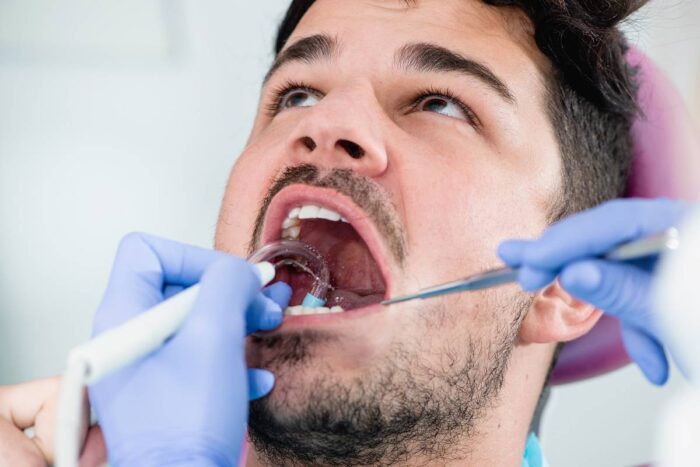Most people cannot afford dental visits without insurance or dental assistance programs. The American Dental Association reports that 38.5% of kids have Medicaid or CHIP coverage, while 10.3% have no dental coverage. Among adults aged 19 to 64, only 7.4% receive Medicaid dental benefits. The rest rely on private dental plans.
While most people search for “dental offices near me that accept Medicaid,” finding one is challenging. In this blog, we’ll discuss how to find a dentist near you, but first, let's understand Medicaid dental coverage.
Medicaid Dental Coverage: Overview
Medicaid provides free or low-cost health insurance to low-income individuals and families. States and the federal government fund it, and the federal government mandates coverage for healthcare costs.
The states can decide which dental benefits adult Medicaid recipients receive. Less than half of states offer comprehensive dental care to adults, although most provide emergency dental care. Dental coverage for adults is not subject to any minimum requirements.
Most dental services are available to Medicaid recipients under 21 in all states.
The program includes a variety of benefits for children, called the Early and Periodic Screening, Diagnostic, and Treatment (EPSDT) program. A child's dental needs can be met with the help of a Medicaid dentist.
Children receive the following dental care at the very least:
- Pain and infection relief
- Teeth restoration
- Maintaining dental health
States Accepting Medicaid For Dental Care
Medicaid provides different levels of dental care to adults depending on the state. Detailed information on Medicaid dental benefits for each state is available from the Center for Health Care Strategies, Inc.
Some states offer comprehensive insurance policies that cover preventative and diagnostic care, as well as restorative care, such as fillings and x-rays. Among other treatments, they might provide crowns and extractions.
States Providing Comprehensive Dental Services:
- California
- Colorado
- Connecticut
- District of Columbia
- Idaho
- Illinois
- Iowa
- Massachusetts
- New Jersey
- New Mexico
- New York
- North Carolina
- North Dakota
- Ohio
- Oregon
- Rhode Island
- Washington
- Wisconsin
States Offering Emergency Dental Services:
- Alaska
- Arizona
- Florida
- Georgia
- Hawaii
- Maine
- Nevada
- New Hampshire
- Oklahoma
- Texas
- Utah
- Virginia
- West Virginia
Other states may provide "limited" care that only includes exams and fillings. There may also be a dollar limit for some services or a pre-approval requirement.
- Pennsylvania
- South Carolina
- South Dakota
- Vermont
- Wyoming
- Nebraska
- Missouri
- Mississippi
- Minnesota
- Michigan
- Louisiana
- Kentucky
- Kansas
- Indiana
- Arkansas
Take note as well that the Medicaid program is not accepted in four states: Alabama, Delaware, Maryland, and Tennessee.
How To Find A Medicaid Dentist

To find a dentist, search for “dental offices near me that accept Medicaid.” Nonetheless, finding one who treats Medicaid patients can be a bit more difficult. These steps will help you find a dental professional who accepts Medicaid.
Determine Your State’s Policy
Medicaid coverage varies by state, so contact your state's Medicaid office or visit their website for more information. You should find details about exactly what is covered there.
Most states administer Medicaid dental benefits through managed care programs.
Depending on which third-party program your state uses, they can provide you with a list of dentists you can consult. The Medicaid office in your state will be able to direct you to the appropriate program.
Select A Qualified Dental Professional
Finding a dentist who will treat Medicaid patients is the first step. Based on their services and location, the list can be narrowed down. If you have questions, you can contact them. For instance, you should know whether they will help you submit Medicaid claims or if you must do it yourself. If your children are treated at their practice, you'll also want someone friendly and welcoming.
Check The Benefits Offered
Schedule an appointment once you've chosen a dentist. Ask the professional about specific treatments, such as fillings or crowns. Ask them to describe their diagnosis, suggested treatment, and cost.
Consider the costs of treatment in light of Medicaid's benefits. Your dentist can discuss payment options if the procedure costs more than your Medicaid plan covers. Additionally, they often offer discounts or payment plans.
Frequently Asked Questions
The following are some of the most commonly asked questions by people searching for dental offices near them:
Medicaid-eligible beneficiaries under 21 can receive most dental services, including relief of pain and infections, teeth restoration, and maintaining good dental health. Less than half of the states provide comprehensive dental care to adults, but most offer emergency dental care.
The Georgia Medicaid dental program only covers emergencies for adults. Children's dental care includes pain relief, infection treatment, tooth restoration, dental health maintenance, fluoride treatments, dental X-rays, and annual dental exams.
The Missouri Medicaid program does not cover dentures, snap-ins, or partial dentures. In some cases, Medicaid Missouri might cover dentures if certain criteria are met.
Yes. Oklahoma Medicaid, also called SoonerCare, offers limited dental services for adults that cover full and partial dentures.
The Hoosier Healthwise Indiana Medicaid plan covers services like prescription drugs, doctor visits, mental health services, dental care, hospitalization, surgeries, and family planning at little to no cost to members.
If you search “dental offices near me that accept Medicaid,” you will easily find dental services covered for children under 21. However, adults may have a harder time finding Medicaid dental coverage.
Fortunately, several organizations offer grants and other types of funding to help make dental treatments more accessible to larger groups of people. You can learn more about dental grants for individuals at Gov Relations.







